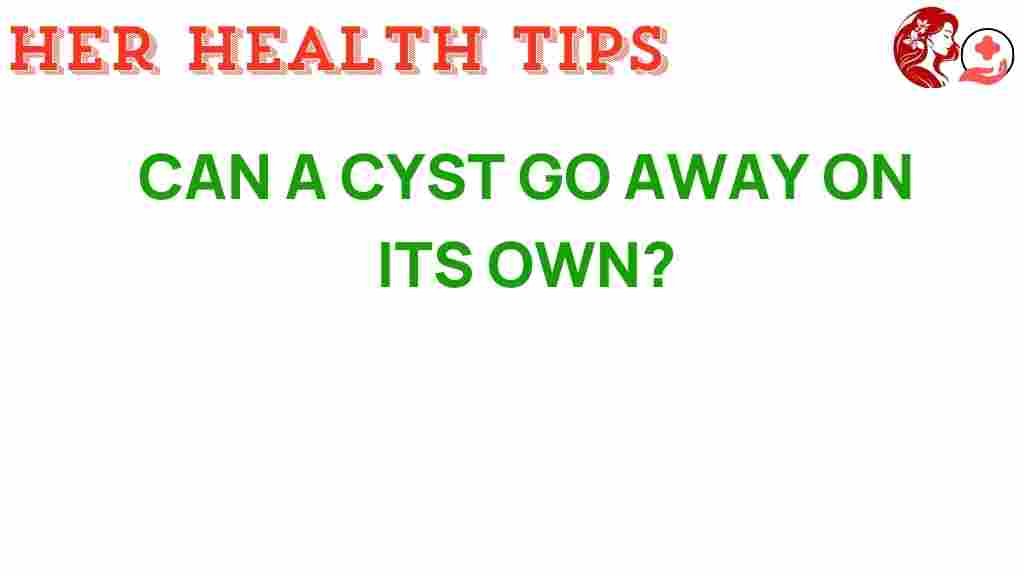The Surprising Truth: Can a Cyst Disappear Without Treatment?
Cysts are common fluid-filled sacs that can develop in various parts of the body. While many people assume that cysts require medical intervention for removal, there’s a surprising truth: some cysts can indeed disappear without treatment. This article delves into the nature of cysts, their symptoms, potential for self-healing, and natural remedies that may support wellness. We will explore how to approach diagnosis, treatment options, and prevention strategies to maintain good health.
Understanding Cysts
A cyst is a closed sac-like structure that can be filled with fluid, semi-solid material, or gas. They can form in different tissues throughout the body, including the skin, organs, and bones. Here are some common types of cysts:
- Epidermoid cysts: Often found on the skin, these are formed from the outer layer of skin cells.
- Pilonidal cysts: These occur near the tailbone and can be painful.
- Ovarian cysts: These develop in the ovaries and are common among women of reproductive age.
- Ganglion cysts: Typically found on the wrist or hand, they are filled with a jelly-like fluid.
Symptoms of Cysts
Many cysts are asymptomatic and may not require treatment. However, when symptoms do occur, they can include:
- Swelling or lump in the affected area
- Pain or discomfort, particularly if the cyst is pressing against other structures
- Redness or inflammation around the cyst
- Drainage of fluid if the cyst ruptures
Diagnosis of Cysts
Diagnosing a cyst typically involves a physical examination and may include imaging tests such as ultrasound or MRI. In some cases, a healthcare provider may perform a biopsy to determine the nature of the cyst. If you notice any suspicious lumps, it is important to consult a healthcare provider for an accurate diagnosis.
Can Cysts Disappear Naturally?
The answer is yes; many cysts can indeed disappear without medical treatment. Factors affecting the likelihood of spontaneous resolution include:
- The type of cyst
- Location of the cyst
- Individual health and wellness
- Presence of underlying conditions
For example, some epidermoid cysts may shrink and become less noticeable over time, while ovarian cysts often resolve without intervention during the menstrual cycle.
Natural Remedies for Cysts
While not all cysts will disappear on their own, there are natural remedies that may promote self-healing and improve overall health:
- Warm compress: Applying a warm compress to the cyst can help reduce inflammation and promote drainage.
- Turmeric: Known for its anti-inflammatory properties, turmeric can be consumed or applied topically to support healing.
- Apple cider vinegar: Some people find that apple cider vinegar can help reduce the size of cysts when applied topically.
- Dietary changes: Eating a balanced diet rich in antioxidants can support the body’s natural healing processes.
Incorporating these natural remedies into your wellness routine may enhance your body’s ability to heal itself. However, it’s essential to monitor your symptoms and consult a healthcare provider if you experience worsening symptoms.
Step-by-Step Process for Managing Cysts
If you have a cyst and are considering a natural approach, here’s a step-by-step guide:
- Observe: Keep an eye on the cyst for any changes in size, shape, or symptoms.
- Apply warm compress: Use a warm compress for 15-20 minutes, several times a day, to encourage drainage.
- Try natural remedies: Consider incorporating natural remedies like turmeric or apple cider vinegar into your routine.
- Maintain a healthy diet: Focus on consuming whole foods, fruits, vegetables, and staying hydrated.
- Monitor symptoms: If the cyst becomes painful, inflamed, or shows signs of infection, seek medical advice.
Troubleshooting Tips for Cyst Management
In some cases, cysts may not respond to natural remedies or may cause discomfort. Here are some troubleshooting tips:
- Consult a healthcare provider: If you’re unsure about the nature of your cyst, getting a professional opinion is crucial.
- Consider over-the-counter medication: Pain relief medications can help alleviate discomfort associated with cysts.
- Keep the area clean: Maintaining hygiene can prevent infections, especially for cysts that have ruptured or drained.
- Evaluate lifestyle factors: Stress, lack of sleep, and poor diet can impact overall health; consider making changes.
Treatment Options for Cysts
If a cyst does not disappear naturally or becomes problematic, various treatment options are available:
- Drainage: A healthcare provider can drain the cyst to relieve pressure and discomfort.
- Surgical removal: In cases where cysts are recurrent or troublesome, surgical removal may be recommended.
- Medications: In some cases, corticosteroid injections can help to reduce inflammation.
It’s essential to discuss the best treatment plan with your healthcare provider based on the type and location of the cyst.
Prevention of Cysts
While not all cysts are preventable, certain strategies can help reduce the risk of developing them:
- Maintain a healthy weight: Obesity can increase the likelihood of developing some types of cysts.
- Practice good skincare: Keeping the skin clean and moisturized can help prevent clogged pores that lead to cyst formation.
- Stay hydrated: Drinking plenty of water supports overall health and can help prevent cysts.
- Manage stress: Stress management techniques, such as yoga or meditation, can promote overall wellness.
Conclusion
In conclusion, while cysts can be a source of concern, many have the potential to disappear without treatment. Understanding the types, symptoms, and management options for cysts is crucial for maintaining health and wellness. Natural remedies may offer support for self-healing, but it’s essential to monitor your symptoms and consult a healthcare provider for accurate diagnosis and treatment if necessary. By adopting a holistic approach to health, including proper diet, regular exercise, and stress management, you can enhance your body’s natural ability to heal itself.
For more information on health and wellness, consider visiting this resource. If you have persistent concerns about cysts or other health issues, don’t hesitate to reach out to a healthcare professional.
This article is in the category Conditions and created by HerHealthTips Team
